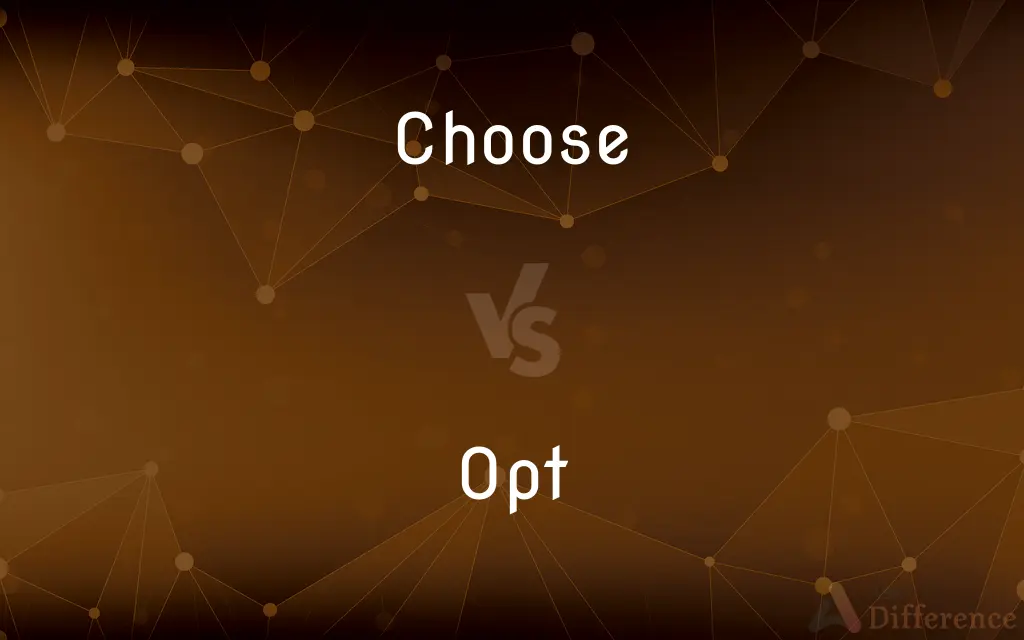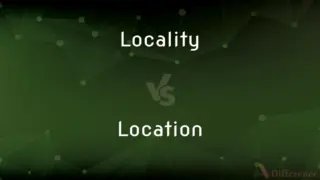Choose vs. Opt — What's the Difference?
By Tayyaba Rehman & Maham Liaqat — Updated on March 29, 2024
Choose implies selecting from a range of options based on preference or judgment, while opt suggests a decision made by actively selecting an alternative over others, often implying a more deliberate choice.

Difference Between Choose and Opt
Table of Contents
ADVERTISEMENT
Key Differences
Choose is a broad term that encompasses the act of selecting between two or more possibilities. On the other hand, opt carries a nuance of selecting a course of action or preference among various alternatives, often after careful consideration.
When you choose a meal from a menu, for example, your decision might be based on immediate preference or taste. Whereas when you opt for a vegetarian diet over other dietary options, it implies a conscious decision possibly based on health, ethical, or environmental considerations. Opting denotes a choice made with a specific intention or purpose in mind.
Choosing can occur in situations where the stakes are relatively low or high, and the range of options can be vast or limited. It's a fundamental part of daily life, from choosing what clothes to wear to making career decisions. Opting, however, often appears in contexts where the decision reflects a deeper preference or a strategic direction, such as opting to work from home instead of the office, suggesting a consideration of personal efficiency or lifestyle preference.
In essence, while choosing is about making a selection, opting is about making a selection with a particular inclination or motive. For instance, choosing a book to read might be about picking one that catches your eye at the moment, while opting to read non-fiction over fiction indicates a preference for real-world knowledge or facts.
The act of choosing is universal and applies to any scenario where a selection is made, regardless of the reason or the depth of thought behind it. Opting, on the other hand, underscores a more focused and reasoned decision-making process, hinting at the presence of a deliberate rationale behind the preference.
ADVERTISEMENT
Comparison Chart
Definition
To select from two or more possibilities.
To make a choice with a particular preference in mind.
Implication
Implies a selection based on preference or judgment.
Suggests a deliberate choice among alternatives.
Decision Depth
Can range from casual to significant decisions.
Often implies a more thoughtful or reasoned decision.
Context
Broad, applies to any scenario with alternatives.
Implies a specific inclination or reason for choosing.
Example Use
Choosing a movie to watch.
Opting to recycle as part of an environmental effort.
Compare with Definitions
Choose
To decide on a preference.
He chose to stay home on weekends.
Opt
To make a deliberate choice.
Many opt for comfort over style in their clothing.
Choose
To pick based on criteria.
They choose the best candidate for the job.
Opt
To select an alternative.
Given the option, he opted to work remotely.
Choose
To elect or decide.
Voters choose their leaders in elections.
Opt
To decide on a preference with intention.
They opted for renewable energy sources to reduce carbon footprint.
Choose
To select from a range of options.
She had to choose between the blue and the red dress.
Opt
To prefer one option.
He opted out of the agreement, citing personal reasons.
Choose
To make a selection.
Choose your meal from the menu.
Opt
To choose specifically.
She opted into the program after much consideration.
Choose
To select from a number of possible alternatives; decide on and pick out
Which book did you choose at the library?.
Opt
To make a choice or decision
Opted for early retirement.
Opted not to go.
Choose
To prefer above others
Chooses the supermarket over the neighborhood grocery store.
Opt
(intransitive) To choose; select.
He opted not to go.
She opted for the salad rather than the steak.
They opted against taking the train, preferring the bus.
Choose
To determine or decide
Chose to fly rather than drive.
Opt
Select as an alternative; choose instead; prefer as an alternative;
I always choose the fish over the meat courses in this restaurant
She opted for the job on the East coast
Choose
To make a choice; make a selection
Was used to doing as she chose.
Choose
To pick; to make the choice of; to select.
I chose a nice ripe apple from the fruit bowl.
Choose
To elect.
He was chosen as president in 1990.
Choose
To decide to act in a certain way.
I chose to walk to work today.
Choose
To prefer; to wish; to desire.
Choose
(mathematics) The binomial coefficient of the previous and following number.
The number of distinct subsets of size k from a set of size n is or "n choose k".
Choose
The act of choosing; selection.
Choose
The power, right, or privilege of choosing; election.
Choose
To make choice of; to select; to take by way of preference from two or more objects offered; to elect; as, to choose the least of two evils.
Choose me for a humble friend.
Choose
To wish; to desire; to prefer.
The landlady now returned to know if we did not choose a more genteel apartment.
Choose
To make a selection; to decide.
They had only to choose between implicit obedience and open rebellion.
Choose
To do otherwise.
Thou canst not choose but know who I am.
Choose
Pick out, select, or choose from a number of alternatives;
Take any one of these cards
Choose a good husband for your daughter
She selected a pair of shoes from among the dozen the salesgirl had shown her
Choose
Select as an alternative; choose instead; prefer as an alternative;
I always choose the fish over the meat courses in this restaurant
She opted for the job on the East coast
Choose
See fit or proper to act in a certain way; decide to act in a certain way;
She chose not to attend classes and now she failed the exam
Common Curiosities
Can opt be used in negative constructions?
Yes, "opt out" is a common negative construction, indicating a decision to not participate or choose an alternative away from something.
Is choosing only about picking one thing over another?
Choosing can involve picking one option over another, but it can also be about making a selection from a range of possibilities, not necessarily in opposition.
Can organizations opt for policies?
Yes, organizations can opt for specific policies, indicating a deliberate choice based on their goals or values.
Do I choose or opt for a career path?
You can use both, but "opting for a career path" suggests a more deliberate decision, while "choosing a career path" is more general.
Why is it important to understand the difference between choose and opt?
Understanding the difference helps in conveying the depth of decision-making involved, whether it’s a casual selection or a deliberate choice.
Is opting always a more deliberate action than choosing?
Yes, opting generally implies a more thoughtful and deliberate decision-making process compared to the broader act of choosing.
How do I know when to use choose or opt?
Use "choose" for general selections and "opt" when you want to emphasize a thoughtful or preferred decision.
Is opting out the same as refusing?
Opting out is a form of refusal but is typically used in contexts where participation is initially assumed or offered.
Is it possible to use choose and opt interchangeably?
While in many contexts they can seem interchangeable, "opt" carries connotations of intentionality and preference that "choose" does not always imply.
Can you opt without having options?
Opting inherently involves having options, as it denotes a choice made among alternatives with a specific preference in mind.
What happens after you opt for something?
After opting for something, actions or decisions follow based on the specific preference or choice made.
Can a choice be involuntary?
While most choices are considered voluntary, some decisions might feel compulsory due to circumstances, making "choose" feel less voluntary than "opt."
Can I opt in to something?
Yes, "opting in" means choosing to participate in something, indicating a proactive decision.
Does choosing require careful thought?
Choosing can require careful thought, but it doesn’t inherently carry the same emphasis on deliberation as opting does.
Is choosing more about preference?
Yes, choosing often revolves around personal preferences or judgments among alternatives.
Share Your Discovery

Previous Comparison
Doe vs. Nanny
Next Comparison
Locality vs. LocationAuthor Spotlight
Written by
Tayyaba RehmanTayyaba Rehman is a distinguished writer, currently serving as a primary contributor to askdifference.com. As a researcher in semantics and etymology, Tayyaba's passion for the complexity of languages and their distinctions has found a perfect home on the platform. Tayyaba delves into the intricacies of language, distinguishing between commonly confused words and phrases, thereby providing clarity for readers worldwide.
Co-written by
Maham Liaqat













































